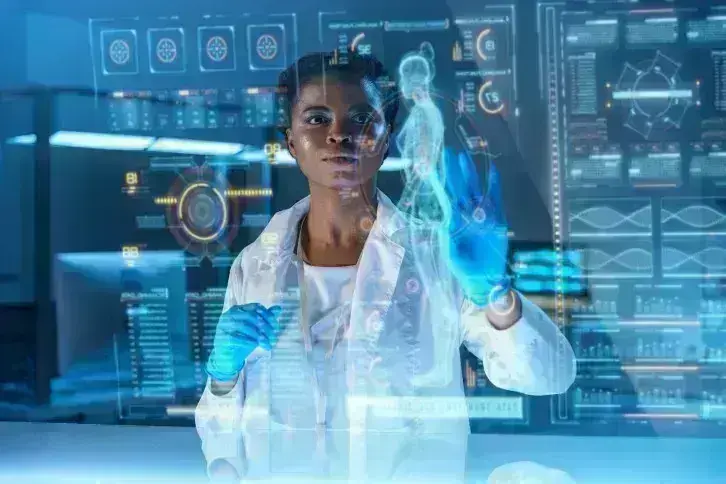
What is AI in healthcare?
AI enhances healthcare through data analysis, improving diagnostics, drug discovery, personalized medicine, reducing unnecessary procedures, and increasing access to specialized care.
Artificial intelligence (AI) is everywhere today. Applications of AI include banking, social media platforms, education, online shopping, and many other aspects of everyday life. What exactly is AI?
AI refers to the use of complex algorithms to improve human ability in performing tasks and decision-making. With a strong computational power provided by cloud computing, these complex algorithms can analyse massive amounts of data to uncover hidden patterns that the human mind cannot identify because of our limited ability to remember and process information.
Given AI’s ability to analyse large amounts of data to uncover hidden patterns in them, AI in healthcare has also significantly increased. We shall now examine how AI in healthcare makes a big difference in the way we diagnose and treat diseases.
How AI helps healthcare
The major strength of AI in healthcare is specialised and complex software algorithms to process medical data, identify hidden patterns in the medical data, and apply what the algorithms have learned from these identified patterns to new medical data.
Let’s illustrate how such a process of AI in healthcare works by using a simple real-world application. Magnetic resonance imaging (MRI) and X-rays are two widely used methods to capture images of a human body’s insides. A major application of these medical imaging methods is to scan for cancerous tumours in the human body.
Traditionally, after these images have been captured, a trained human radiologist analyses them to determine if a cancerous tumour is present. The human radiologist makes a professional assessment based on his medical training and years of experience in analysing hundreds or even thousands of such medical images.
However, even for highly experienced radiologists, there is a limit to the number of images they can analyse individually. Besides, for cases where the cancerous tumours are small, it can be difficult for the radiologist to see fine details to make an accurate diagnosis. However, with AI in healthcare, the number of images that can be analysed is almost infinite. Identifying cancerous tumours’ accuracy is significantly increased, even for small tumours that a radiologist may have difficulty seeing.
The most important application of AI in healthcare is machine learning. To apply machine learning to help radiologists diagnose cancer tumours much more accurately (even those that a radiologist may have difficulty seeing) radiologists first prepare tens of thousands or even hundreds of thousands of images of tumours of all shapes and sizes. Radiologists also label the pictures as containing cancerous tumours or non-cancerous tumours.
Specialised and complex algorithms then analyse these labeled images and learn about them. In examining these large quantities of images, the algorithm will find patterns in the images labeled as containing cancerous tumours that differ from the images labeled as not containing cancerous tumours. With sufficient computational power and a sufficiently large quantity of images to train the algorithm on, the algorithm will find patterns that the human radiologist cannot find.
Once the algorithm has successfully learned from the images that have been provided to it, radiologists can then give the algorithm new tumour images which the algorithm can then predict with a very high degree of accuracy whether the new tumour image contains cancerous tumours, even for small tumours that a human radiologist may not be able to see clearly.
Artificial intelligence in healthcare is not just restricted to learning MRI or X-ray images. Complex software algorithms can learn all kinds of medical data to uncover hidden patterns in the data that a human medical doctor cannot see. For example, machine learning algorithms can be trained to identify subtle and irregular patterns in electrocardiogram (ECG) signals that may not be visible to a physician, thus alerting the physician to the possibility of an impending heart attack may have otherwise been missed.
With a much greater understanding of how AI’s most important application in healthcare works, we shall now apply this understanding to examine AI in healthcare examples.
AI in healthcare – examples
Drug discovery One of the most promising AI in healthcare examples is drug discovery. With the use of AI in healthcare, the speed of drug discovery can be significantly accelerated. One of the most famous drug discoveries in recent times using AI is the antibiotic chemical compound halicin, which MIT researchers discovered through artificial intelligence to examine existing chemical compounds. They trained an algorithm to see patterns between a molecule’s structure and its ability to kill bacteria. Once the algorithm was trained, the researchers used the algorithm to analyse an extensive database of known chemical compounds and halicin was identified in the process.
Clinical trials Besides identifying new drug candidates, clinical trials to test these newly identified drug candidates can also benefit from AI in healthcare. For example, AI algorithms can be used to analyse potential clinical trial participants’ medical records to determine the extent of their suitability for undergoing a clinical trial. There are two major benefits: clinical trials can become safer by more accurately screening out unsuitable candidates. They can also be completed more quickly with more robust results because only highly suitable candidates were selected to undergo the clinical trial.
Medical screening Using AI in healthcare can also increase the speed of medical screening. For example, the Beth Israel Deaconess Medical Center at Harvard University has been using artificial intelligence to increase the speed in which they can screen for blood infections. By using an automated microscope that takes high-resolution images of blood samples on microscopic slides and then passing the image into an algorithm that has been trained to detect the presence of bacteria accurately in the blood sample, the doctors could very quickly get accurate results of the presence of a blood infection, which allows them to determine an appropriate course of medical treatment much more rapidly providing to than through traditional screening methods.
Personalised medicine Using AI in healthcare, individuals can also receive more personalised medicine and treatment options. Information from the individual’s past medical history can be processed using artificial intelligence algorithms to help doctors develop a more appropriate course of medical treatment by analysing data such as drug allergies and medication history, reducing the chances of prescribing an ineffective treatment course.
Reduction of unnecessary procedures Unnecessary invasive procedures can also be avoided with the use of AI in healthcare. For example, using mammograms or chest X-rays to detect breast cancer traditionally results in a high proportion of false positives. Many women end up undergoing invasive biopsy procedures to confirm whether they indeed have breast cancer when they did not need to. With AI in healthcare, machine learning algorithms are extremely accurate in identifying whether the tumours captured on a mammogram are cancerous, thus reducing the amount of unnecessary pain and costs of an invasive biopsy.
Increased access to primary healthcare AI in healthcare can also help to increase the access of essential professional medical advice to the population. For example, in the United States, Babylon Health has developed a chatbot where users can talk to the chatbot about their symptoms. Artificial intelligence algorithms analyse the symptoms provided to the chatbot and then recommend a course of action back to the user. Using artificial intelligence instead of human medical experts, access to accurate and timely medical advice is significantly increased.
Increased access to specialised healthcare in rural areas Other than increasing access to essential professional medical advice, another related AI in healthcare is providing specialised medical advice and procedures to rural areas. With the development of stable and fast wireless 5G technology, medical specialists located in major cities and towns can provide their services to people living in rural areas. Using 5G technology, medical facilities in remote areas can be outfitted with medical robots controlled by medical specialists located far away. During a medical procedure, medical robots and equipment can continuously send information from remote medical facilities to servers in major hospitals to process using artificial intelligence, thus improving the outcomes of complex medical procedures performed in rural areas using medical robots.
Proactive health management By combining AI in healthcare with the Internet of Medical Things (IoMT), people can also more proactively take care of their own health so that they do not fall sick that often reduces the strain on healthcare systems and improves individual health outcomes. Wearable technology such as smartwatches can continuously gather health-related information about the individual such as their sleep and exercise patterns. These data can then be analysed using AI machine learning algorithms to alert the individual on their lifestyle and the actions that they need to take to continue to stay healthy.
Better quality medical training AI in healthcare can also increase the quality of training for medical doctors. For example, natural language processing can generate fictitious but highly naturalistic medical scenarios to train medical doctors on a wide range of medical situations and how to handle them. They can even be used to produce realistic simulated patient visuals and speeches to help train medical doctors on how to better communicate and handle many different types of patients during a medical consultation, thus increasing the medical consultation quality.

Contact us.
If you need a partner in software development, we're here to help you.
We will respond to your enquiry immediately.